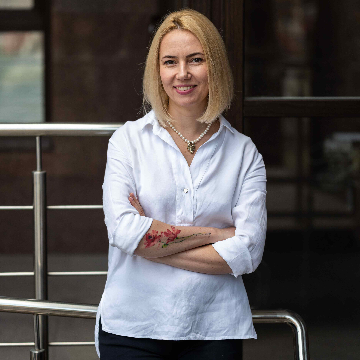
Tetiana Shulika, Head of 1+1 Production fiction: "Cinema is a part of our resistance"
Since the beginning of the full-scale invasion, the team of 1+1 Production fiction, the production division of 1+1 media, has had to completely reorganise its work and adapt to the new reality.
First of all, to refocus on creating documentary projects. The focus was on news and the production of films that could record and reveal the chronology of the Great War in more detail.
Today, the situation and needs of Ukrainian viewers are gradually changing. There are discussions in society about what our cinema should be like and whether Ukraine needs it now.
In an interview, Tetiana Shulika, the head of 1+1 Production fiction, told us what series projects her team is currently working on, what content is in demand in Ukraine today, and how strengthening the film and series production industry can become an important part of our cultural resistance.
We have entered the third year of the full-scale war. How would you describe the current trends? What kind of content do viewers want now?
Judging from the results of TV viewing, from various surveys on the emotional state and mood of society, Ukrainians are most interested in watching content not related to the war. To distract themselves and try to find solace in interesting and atypical stories. I used to think it was comedies and family stories. But now I watch mystery, detective stories, and drama, but not about the events outside the window. It's not that it's escapism, but people psychologically need a little distraction. War is the main part of our lives nowadays. But there are other important things in it that help us stay afloat and, ultimately, not lose hope and keep the strength to win.
Does this indicate that there is a renewed interest in everyday stories?
This interest has never really gone away. If you think back to the beginning of the Great War, most people couldn't watch anything at all. They only watched the news. We had no time for books or films. This is how the psyche works. It's a reaction to stress. And then, when we had adapted a bit, we started watching content not about the war. Because we are already living in war. And war is a very difficult thing that takes up most of our lives and our thoughts. Cinema and television are about emotions. We have an overabundance of bad emotions, so people watch what will give them good emotions. Or at least those products that are not about war, but about normal, peaceful life.
In order for our stories to be heard by the world, they must be of the right quality.
Two years ago, your team started working on the Live on project. A whole "tutorial" with answers to a completely new question: how to survive in a new world for us? What stage is this project at now?
Unfortunately, we are not working on it now. We started it at the beginning of the war, and it took us about a year from the idea to full implementation. This is a very important project, both for our team and for the audience. It was about how we can all adapt to the new realities and find our place in the new Ukraine, in the new universe we now live in.
Have we moved away from the question of "How to live further" and is it not time for us to think: "Okay, we have adapted. How can we improve our lives now?"
Of course we should! I think it is very important to understand that, yes, the war has completely turned our lives upside down, but it has not stopped them. We all move on, in all areas. We have changed our social circle, often our jobs, and many of us are going through personal and family changes. We move on with our lives. And in the same way, in the profession, we must continue to develop, the level of our stories, the level of our professionalism must grow. Because, in addition to being important for business, this is now our mission in the global market. For our stories to be heard by the world, they must be of the right quality.
How does this context affect content production?
Very much. During the war in Ukraine, there were only a few cases where producers found foreign co-production partners. I'm not talking about grant support, but co-production. This mostly happened in the first year of the full-scale invasion, on the wave of heightened interest in us.
What is the international market interested in now?
They are interested in good, high-quality, unique stories with well-developed characters. Co-productions require a story that will be interesting to all countries involved in the production. So far, there are few cases when our (Ukrainian - ed.) fiction stories would be of interest to foreign partners. And, for the most part, they are not related to the war. But we want to enter the international market and are working on it.
However, now, when there is a tendency for international "fatigue" from Russia's war against Ukraine, documentaries that convey information about us to the world are much more effective. There is a demand for them and this is a real example of how important content is during a war. Often foreigners think that if we have restaurants, enterprises, business, agriculture working here, we are not starving and we are working, then everything is fine here. They don't understand the level of heroism of those farmers who are wearing bulletproof vests and clearing their fields of mines. In this respect, films like 20 Days in Mariupol or The Long Day are more effective. These films are difficult for the Ukrainian audience to watch because they are actually about our current life,
And for the international community, these are very important works. Now we need to remind the international community of what is happening by all means, including through our work.
Is art now closely linked to politics?
Art has always been closely linked to politics. Culture is a part of the country's life. Films and TV series are mass art and shape public opinion no worse than the news. This is well known. This is why we receive grant support from foreign funds for artistic production. Provided that we talk about topical issues that are important for the support of society at this time. Cinema has a strong influence on the worldview.
Every film is a story. How do television and cinema work? They evoke an emotion, and behind the emotion is a message, and the viewer sees events that are presented in a certain way and tell a story from the point of view of one of the characters. It's about storytelling in any form and in any format.
Is grant support from foreign partners enough to create content in Ukraine?
It depends on the budget we are talking about. We currently have two artistic projects in production, funded by an American grant. These are stories about the war, and we are embedding in them messages that I personally, as a citizen, consider very important for our society today. In particular, about unity with the temporarily occupied territories, about the fact that people in those territories remain Ukrainians and we are waiting for them to return "home". That when they are liberated, we will have to work together to help them overcome the traumas they have suffered during their life under occupation. Because it's scary to even imagine.
Unfortunately, our war is not the first. Cinema has existed for more than a hundred years, and it was especially active during the Second World War. Is it possible to spy on that era and look for clues for us today?
It is possible. And we have been doing it since the beginning. During the Second World War, Hollywood began to flourish, and a lot of comedies were produced there. These were classic stories that at that time helped people switch from the horrors of the world around them and remember that there is a place for Christmas, family traditions, and just funny stories.
Every film is a story. How do television and cinema work? They evoke an emotion, and behind the emotion is a message, and the viewer sees events that are presented in a certain way and tell a story from the point of view of one of the characters. It's about storytelling in any form and in any format. Cinema works the same way. It's a way of telling a story from our point of view.
Our enemy has the opposite point of view, and they do a great job of spreading it.
...the world must understand that by helping us, they are protecting themselves. For three years now, we have been standing between the world and hell.
Have you analysed for yourself how Russians are currently investing in their film industry?
Even from what is on the surface, we can conclude that they are actively investing in the film industry. Their series production has not stopped. Their channels are working, they shoot comedies and detective stories. But what we noticed is when trailers for some military films appear. We widely discussed the Russian film Witness, which tells the story of the events in Bucha. Judging by the trailer, they invested a considerable budget in it, and it was shot with high quality and on a large scale. The trailer shows the terrible "nationalists and Banderites" who torture and kill their own people. Of course, this is a distortion of our reality to achieve their goals.
In this case, it's a way of waging information warfare through artistic content.
The Russians are investing, it's visible even on the surface. And what about us? To what extent does our content production depend on state support?
It depends. We remember that when the IFFI announced the competition last year, we finally saw a revival in the film market. A few months before that, TV channels had already started to allocate funds for content, but budgets are, of course, much more modest now. And grants are rare. That's why, thanks to the state competition, we had a feeling that everything was fine in the market for six months. We had work, and our teams were busy filming. This is extremely important now. And it's very important for our society to understand that cinema is also a way to shape the reality in people's minds. It's not about manipulating them, it's about supporting them. What stories usually win the grant? These are stories about strength, about a feat, about some local but very important victory. This is what keeps you going, what you watch, and it inspires you and gives you the strength to move forward.
Is cinema part of our resistance?
Yes, it is. These are our messages, part of our resistance, the struggle for thoughts. The war can lead to despondency, and people can give up. And this is the support of people inside. This is one direction. And the second direction is to tell stories about us to the world. Because the world needs to understand that by helping us, they are protecting themselves. For three years now, we have been standing between the world and hell.
Why does the film industry have to work in a time of war?
Because this is one of the methods of resistance. It is the formation of our consciousness. We are free as long as our minds are free. And this struggle for our consciousness is taking place, among other things, through TV series and film production. The industry has to survive and develop. A lot of professionals have changed professions, left the country, some have taken up arms and are destroying enemies on the frontline.
But those who are here must do their job and develop. It is important for the country and it is a business that has to work, pay taxes and give its employees the opportunity to donate.

